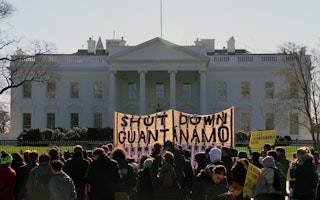CIA Torture in Romania: Europe’s Top Human Rights Court Hears Al-Nashiri Complaint
NEW YORK—The Romanian government was today accused before the European Court of Human Rights (ECHR) of continuing “to cover up the truth” about the existence of a secret prison on its territory between 2003 and 2005, used by the U.S. Central Intelligence Agency to torture and interrogate a Saudi citizen, Abd al-Rahim al-Nashiri.
Speaking on behalf of the applicant in Al-Nashiri v. Romania, Amrit Singh of the Open Society Justice Initiative told the ECHR judges that it was “inconceivable” that the Romanian government did not know about the existence of the secret CIA site, which operated under the code name “Bright Light”:
“Romania knew—through its own agreement with the U.S. to host a prison in Romania, through its own operational involvement in CIA rendition operations, and through countless credible public sources—that the U.S. was secretly detaining prisoners on Romanian territory, and also transferring them to other locations in the face of real risks.”
The applicant, Ms Singh added, has established ‘strong, clear and concordant’ facts in support of his claims. In contrast, the Romanian government has continued to cover up the truth.”
Diana Hartneanu, a Bucharest-based lawyer who is co-counsel for al-Nashiri, told the court that the Romania government had persistently failed to institute a proper criminal investigation into the abuses perpetrated on its territory, even after its existence became publicly known. She noted that a criminal investigation had only been launched after al-Nashiri was able to file a personal criminal complaint in 2012, and that that complaint that was only taken up by the prosecutor’s office after the ECHR case was officially communicated by the court to the Romanian government.
“At present the investigation is still pending against persons unknown…more than 10 years since the first reports of Romania’s involvement in the CIA program were made public. The prosecution’s efforts to build on the vast amount of information and evidence and international inquiries or U.S. reports already available in the public domain were non-existent,” she said.
The hearing in Strasbourg was the first time that Romania’s involvement in the CIA program has been presented before a court. The case was brought on behalf of al-Nashiri, a Saudi citizen now facing an unfair trial and a possible death sentence before a United States military commission at Guantanamo Bay.
The U.S. Supreme Court has declined to hear complaints brought against the CIA by victims of torture, incommunicado detention and extraordinary rendition.
The statement also noted that Romania received millions of dollars from the United States to host the prison, and that many details of the arrangement coincided with the account presented in the U.S. Senate intelligence committee’s report on CIA torture, released in 2014, in reference to the facility the report calls "Detention Site Black."
The Senate report also confirmed that al-Nashiri was subjected to “rectal feeding” while detained in Bucharest after an attempt at launching a hunger strike. He was forced to lie facing upwards with his head below his torso as CIA operatives infused a nutrition drink into him through his rectum. Al-Nashiri was also subjected to abusive CIA conditions of confinement while held in Romania, including solitary incommunicado detention, blindfolding or hooding, continuous noise, continuous light, leg shackling and forced shaving. During the first month of detention there, prisoners were subjected to sleep deprivation, water dousing, slapping and forcible standing in painful positions.
After being secretly transferred out of Romania, al-Nashiri was subsequently moved, also in secret, to another country before he was brought in September 2006 to Guantanamo Bay. Al-Nashiri’s counsel is also asking that the Romanian government urgently seek assurances from the U.S. government that he will not be subjected to the death penalty and a flagrant denial of justice.
Despite a report from the Council of Europe identifying Romania as hosting one of the CIA’s so-called “black site” secret prisons, the Romanian government has persistently denied any knowledge of these operations. Romania was one of over 50 governments around the world that supported a program of secret rendition and torture launched by the CIA after the September 11, 2001, attacks on the United States, as detailed in the Justice Initiative’s 2013 survey, Globalizing Torture: CIA Torture and Extraordinary Rendition.
Al Nashiri was also represented at the hearing by the Justice Initiative’s Rupert Skilbeck.
This case before the ECHR follows the court’s July 2014 ruling in a similar but separate case brought by the Justice Initiative on al-Nashiri’s behalf against Poland, where he was also secretly detained and interrogated before he was brought to Romania. The court ruled then that Poland was responsible for his secret detention and torture at a CIA prison at Stare Kiejkuty; an appeal by the Polish government against the decision was turned down.
The Justice Initiative argues that Romania violated al-Nashiri’s rights under the European Convention on Human Rights by hosting the secret CIA prison where he was subjected to torture and ill-treatment, and by allowing his transfer out of the country despite the risk of further ill-treatment, an unfair trial and possible death sentence. The complaint also accuses Romania of failing in its duty to properly investigate what happened, as required by the convention.
In December 2012, in another case argued by the Justice Initiative, the European Court of Human Rights condemned the arbitrary arrest, detention and interrogation of Khaled El-Masri, a German citizen who was seized and secretly detained by Macedonian agents in 2004, handed over to the CIA, and flown to Afghanistan for further secret detention and interrogation.
Read more
National Security and Human Rights
Rebuilding and Resilience: 20 Years Since 9/11

On the 20th anniversary of the 9/11 attacks, Open Society shares reflections from partners on the road traveled since—and the hard work still ahead.
19 Shameful Years
Torture’s Terrible Toll

The horror stories emanating from Guantanamo Bay shock the conscience. It is long past time to close the prison.
Standing Up to Big Brother
Q&A: A Big Step for Global Privacy Rights

By ruling against a government intelligence agency, one of the most powerful courts in Germany has struck a blow for data privacy and free expression.